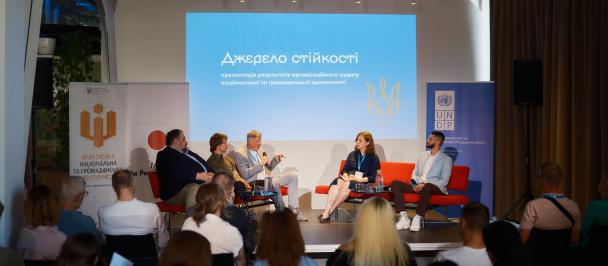Exploring a partnership model for the future in support of the dyeing tradition in Mali
June 17, 2024

Constructing a water point. Training women on marketing skills. Distributing Personal Protective Equipment. It all sounds familiar – a regular UNDP project. Except that it’s funded entirely by two companies hailing from Italy and Japan, joining forces with UNDP Accelerator Lab Mali and the sub-regional hub in Dakar, Senegal to support the health and working environment of women involved in Mali’s vibrant bazin dyeing tradition. This blog highlights how this project is unique, and how it could potentially pave the way for a new form of private sector engagement in the region.
Traditional textile dyeing practices have long been known to have adverse health and environmental impacts. Women continue to suffer from respiratory diseases due to exposure to chemical dyes, and although accurate figures are difficult to obtain, numerous reports indicate children suffering from the same symptoms. The remains of the dyeing solution are often discarded into nearby gutters, flowing into the Niger River and polluting the surface and groundwater.
To protect the women who make up the majority of the dyeing workforce, UNDP teamed up with Brunello and Asahi Kasei Fibers Italia to tackle these issues head-on. Brunello has been creating top-quality fabrics and linings made in Italy since 1927, including the high-end fabric branded "BemBAZIN™." It uses the "Bemberg" yarn produced by the multinational Japanese chemical company Asahi Kasei, which is manufactured sustainably from cotton linter, a natural by-product of the cottonseed oil production process. The BemBAZIN™ fabric is being sold in Mali through a local vendor.
Here is what the project has achieved so far:
- 40 people (35 women) involved in traditional dyeing underwent health check-ups to diagnose potential respiratory and skin diseases associated with exposure to chemical dyes.
- A water point was constructed, allowing 24/7 access to water for 100 workers.
- 50 people working for 4 artisanal dyeing associations were trained on communication and digital marketing skills.
- Personal protective equipment such as masks, gloves, boots, and aprons, as well as furnaces, metal and plastic buckets, were distributed, benefiting 200 workers.
- A sensitization campaign on the health risks for women dyers and the correct use of PPEs was conducted, reaching approximately 10,000 people.
Aichata Fofana, who has worked in the artisanal bazin dyeing industry for 25 years, has witnessed first-hand the benefits of the newly constructed water point. "With easier access to water, my productivity has soared," she shares. This boost in productivity has had a ripple effect, enabling her to cover the school fees for her two children. "It's more than just income; it's about securing a future for my children," she adds.
Fatoumata Nimaga experienced her first-ever health check-up through the project. "After years of battling skin irritations and incessant coughs from the chemicals, this check-up was a relief," she confesses. The medical attention has brought not only physical relief but also a sense of being valued and cared for, changing her perspective on workplace health and safety.
Malamine Diallo, a young bazin trader, found the digital marketing training to be a revelation. "I was familiar with TikTok, but the training opened my eyes to a whole new set of tools," he enthuses. Armed with these skills, he now sees a clear path to expanding his customer base and increasing sales. "It's about reaching the right people with the right message," he notes, optimistic about the potential growth of his business.
Beyond these numbers and testimonies, the real value of the project lies in its innovative funding model, whereby the companies contributed 5 cents to UNDP for every metre of BemBAZIN™ sold in Mali. This way, the more it becomes popular, the more it benefits the socioeconomic development of the women dyers.
The narrative that the private sector could play a prominent role in development has been around for decades. However, despite the goodwill of companies like Brunello and Asahi Kasei Fibers Italia, the potential to tap into private sector resources has often been overlooked in favor of traditional funding sources. In an era of declining ODA, the project represents a timely reminder that private sector partnership is not just possible; it should also be the way forward.
Like all pilot projects, the challenge is continuity and scale. Thankfully, the companies have appreciated the initiative, and discussions have already commenced for the next phase of the project, due to start in June 2024. With the right approach, the model has the potential to attract other companies and be replicated in different countries.
The biggest challenge, however, lies in transforming the project – currently relying on the goodwill and social values of the companies – into a mutually beneficial model for Creating Shared Value (CSV). CSV is a concept wherein a company’s positive social and environmental impact is integrated into its business model to benefit both the community and the company's profit goals. In other words, how can the project be designed in a way that it supports the women dyers and local youths, who can in turn help drive the BemBAZIN™ sales, leading to increased contributions and more socio-economic benefits for the population?

This is a complicated endeavor that ultimately requires aligning the values, principles and practices of UNDP and the private sector, who differ in corporate decision-making logic and business model. But this is where UNDP Accelerator Lab earns its money with its thinking, facilitation and innovation. Already, the team is exploring the use of local non-GMO and organic cotton for the production of BemBAZIN™. After all, for all its security, political and socio-economic challenges, Mali is the top producer of cotton in Africa¹.
In terms of its scale, this project pales in comparison to others. But with the paradigm shift it brings, it punches well above its weight. It represents an alternative, perhaps more sustainable, model of development for the future.
[1] https://www.africanews.com/2022/03/20/mali-records-highest-cotton-production//


For more information on the project, please contact:
Makhan Sacko: makhan.sacko@undp.org
Tomoki Matsuura: tomoki.matsuura@undp.org

 Locations
Locations

